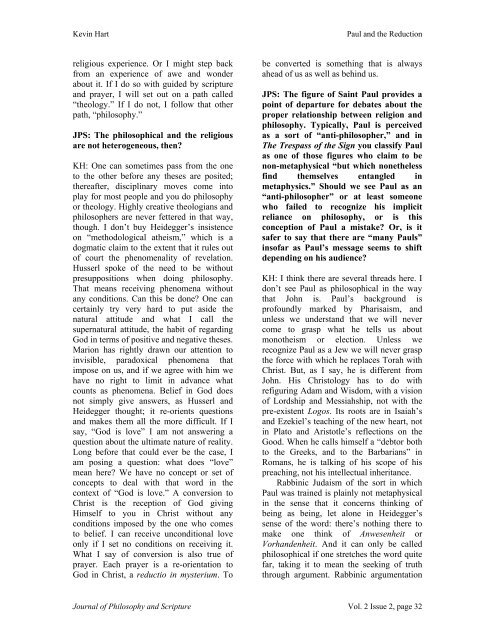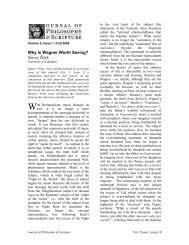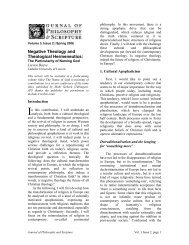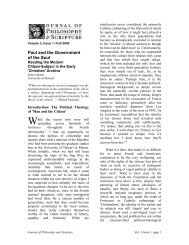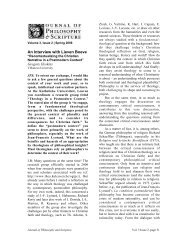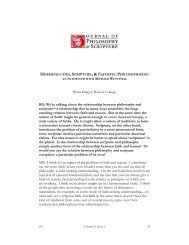An Interview with Kevin Hart - Journal of Philosophy and Scripture
An Interview with Kevin Hart - Journal of Philosophy and Scripture
An Interview with Kevin Hart - Journal of Philosophy and Scripture
Create successful ePaper yourself
Turn your PDF publications into a flip-book with our unique Google optimized e-Paper software.
<strong>Kevin</strong> <strong>Hart</strong><br />
Paul <strong>and</strong> the Reduction<br />
religious experience. Or I might step back<br />
from an experience <strong>of</strong> awe <strong>and</strong> wonder<br />
about it. If I do so <strong>with</strong> guided by scripture<br />
<strong>and</strong> prayer, I will set out on a path called<br />
“theology.” If I do not, I follow that other<br />
path, “philosophy.”<br />
JPS: The philosophical <strong>and</strong> the religious<br />
are not heterogeneous, then?<br />
KH: One can sometimes pass from the one<br />
to the other before any theses are posited;<br />
thereafter, disciplinary moves come into<br />
play for most people <strong>and</strong> you do philosophy<br />
or theology. Highly creative theologians <strong>and</strong><br />
philosophers are never fettered in that way,<br />
though. I don’t buy Heidegger’s insistence<br />
on “methodological atheism,” which is a<br />
dogmatic claim to the extent that it rules out<br />
<strong>of</strong> court the phenomenality <strong>of</strong> revelation.<br />
Husserl spoke <strong>of</strong> the need to be <strong>with</strong>out<br />
presuppositions when doing philosophy.<br />
That means receiving phenomena <strong>with</strong>out<br />
any conditions. Can this be done? One can<br />
certainly try very hard to put aside the<br />
natural attitude <strong>and</strong> what I call the<br />
supernatural attitude, the habit <strong>of</strong> regarding<br />
God in terms <strong>of</strong> positive <strong>and</strong> negative theses.<br />
Marion has rightly drawn our attention to<br />
invisible, paradoxical phenomena that<br />
impose on us, <strong>and</strong> if we agree <strong>with</strong> him we<br />
have no right to limit in advance what<br />
counts as phenomena. Belief in God does<br />
not simply give answers, as Husserl <strong>and</strong><br />
Heidegger thought; it re-orients questions<br />
<strong>and</strong> makes them all the more difficult. If I<br />
say, “God is love” I am not answering a<br />
question about the ultimate nature <strong>of</strong> reality.<br />
Long before that could ever be the case, I<br />
am posing a question: what does “love”<br />
mean here? We have no concept or set <strong>of</strong><br />
concepts to deal <strong>with</strong> that word in the<br />
context <strong>of</strong> “God is love.” A conversion to<br />
Christ is the reception <strong>of</strong> God giving<br />
Himself to you in Christ <strong>with</strong>out any<br />
conditions imposed by the one who comes<br />
to belief. I can receive unconditional love<br />
only if I set no conditions on receiving it.<br />
What I say <strong>of</strong> conversion is also true <strong>of</strong><br />
prayer. Each prayer is a re-orientation to<br />
God in Christ, a reductio in mysterium. To<br />
be converted is something that is always<br />
ahead <strong>of</strong> us as well as behind us.<br />
JPS: The figure <strong>of</strong> Saint Paul provides a<br />
point <strong>of</strong> departure for debates about the<br />
proper relationship between religion <strong>and</strong><br />
philosophy. Typically, Paul is perceived<br />
as a sort <strong>of</strong> “anti-philosopher,” <strong>and</strong> in<br />
The Trespass <strong>of</strong> the Sign you classify Paul<br />
as one <strong>of</strong> those figures who claim to be<br />
non-metaphysical “but which nonetheless<br />
find themselves entangled in<br />
metaphysics.” Should we see Paul as an<br />
“anti-philosopher” or at least someone<br />
who failed to recognize his implicit<br />
reliance on philosophy, or is this<br />
conception <strong>of</strong> Paul a mistake? Or, is it<br />
safer to say that there are “many Pauls”<br />
ins<strong>of</strong>ar as Paul’s message seems to shift<br />
depending on his audience?<br />
KH: I think there are several threads here. I<br />
don’t see Paul as philosophical in the way<br />
that John is. Paul’s background is<br />
pr<strong>of</strong>oundly marked by Pharisaism, <strong>and</strong><br />
unless we underst<strong>and</strong> that we will never<br />
come to grasp what he tells us about<br />
monotheism or election. Unless we<br />
recognize Paul as a Jew we will never grasp<br />
the force <strong>with</strong> which he replaces Torah <strong>with</strong><br />
Christ. But, as I say, he is different from<br />
John. His Christology has to do <strong>with</strong><br />
refiguring Adam <strong>and</strong> Wisdom, <strong>with</strong> a vision<br />
<strong>of</strong> Lordship <strong>and</strong> Messiahship, not <strong>with</strong> the<br />
pre-existent Logos. Its roots are in Isaiah’s<br />
<strong>and</strong> Ezekiel’s teaching <strong>of</strong> the new heart, not<br />
in Plato <strong>and</strong> Aristotle’s reflections on the<br />
Good. When he calls himself a “debtor both<br />
to the Greeks, <strong>and</strong> to the Barbarians” in<br />
Romans, he is talking <strong>of</strong> his scope <strong>of</strong> his<br />
preaching, not his intellectual inheritance.<br />
Rabbinic Judaism <strong>of</strong> the sort in which<br />
Paul was trained is plainly not metaphysical<br />
in the sense that it concerns thinking <strong>of</strong><br />
being as being, let alone in Heidegger’s<br />
sense <strong>of</strong> the word: there’s nothing there to<br />
make one think <strong>of</strong> <strong>An</strong>wesenheit or<br />
Vorh<strong>and</strong>enheit. <strong>An</strong>d it can only be called<br />
philosophical if one stretches the word quite<br />
far, taking it to mean the seeking <strong>of</strong> truth<br />
through argument. Rabbinic argumentation<br />
<strong>Journal</strong> <strong>of</strong> <strong>Philosophy</strong> <strong>and</strong> <strong>Scripture</strong> Vol. 2 Issue 2, page 32


